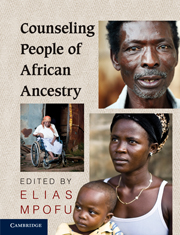Book contents
- Frontmatter
- Contents
- Contributors
- About the Editor
- Editorial Board
- Foreword
- Preface
- Acknowledgments
- PART 1 FOUNDATIONS OF COUNSELING IN AFRICAN SETTINGS
- PART 2 CONTEXTS OF COUNSELING
- PART 3 COUNSELING APPLICATIONS
- 15 Counseling for Trauma
- 16 HIV and AIDS Counseling
- 17 Substance Use Disorder Counseling
- 18 Career Counseling People of African Ancestry
- 19 Counseling People with Disabilities
- PART 4 THE FUTURE OF COUNSELING IN AFRICAN HERITAGE SETTINGS
- Counseling People of African Ancestry Multiple Choice Answers
- Index
17 - Substance Use Disorder Counseling
Published online by Cambridge University Press: 05 August 2011
- Frontmatter
- Contents
- Contributors
- About the Editor
- Editorial Board
- Foreword
- Preface
- Acknowledgments
- PART 1 FOUNDATIONS OF COUNSELING IN AFRICAN SETTINGS
- PART 2 CONTEXTS OF COUNSELING
- PART 3 COUNSELING APPLICATIONS
- 15 Counseling for Trauma
- 16 HIV and AIDS Counseling
- 17 Substance Use Disorder Counseling
- 18 Career Counseling People of African Ancestry
- 19 Counseling People with Disabilities
- PART 4 THE FUTURE OF COUNSELING IN AFRICAN HERITAGE SETTINGS
- Counseling People of African Ancestry Multiple Choice Answers
- Index
Summary
OVERVIEW. Substance use disorders cover a range of problems associated with using and abusing psychoactive substances such as alcohol, cannabis, cocaine, heroin, benzodiazepines, as well as a variety of other substances taken to affect thoughts, feelings, and behavior. Interventions may include a “mix” of approaches, both modern and indigenous, including assessment and diagnosis, self-help intervention, outpatient, diversion and restorative justice approaches, residential care, and harm-reduction tactics. In this chapter, various substance use disorder concepts, the history of substance use disorder practice and research, substance use disorder recovery theories, legal and professional issues related to substance use disorders, as well as issues for further research and scholarship in Africa are examined. Cultural issues that affect and influence the use and treatment of substances use disorders within the African context are also explored.
LEARNING OBJECTIVES
By the end of the chapter, the reader should be able to:
Define key concepts relevant to substance use disorders.
Outline core African indigenous and modern practices used to treat or counsel clients with substance use disorders.
Discuss the rationale of major recovery theories and psychosocial theories relating to substance use disorder counseling.
Discuss legal and professional issues related to substance use disorders within the African context.
Identify prospective areas of research that would advance the knowledge of substance use disorder intervention and scholarship within the African context.
- Type
- Chapter
- Information
- Counseling People of African Ancestry , pp. 265 - 280Publisher: Cambridge University PressPrint publication year: 2011

